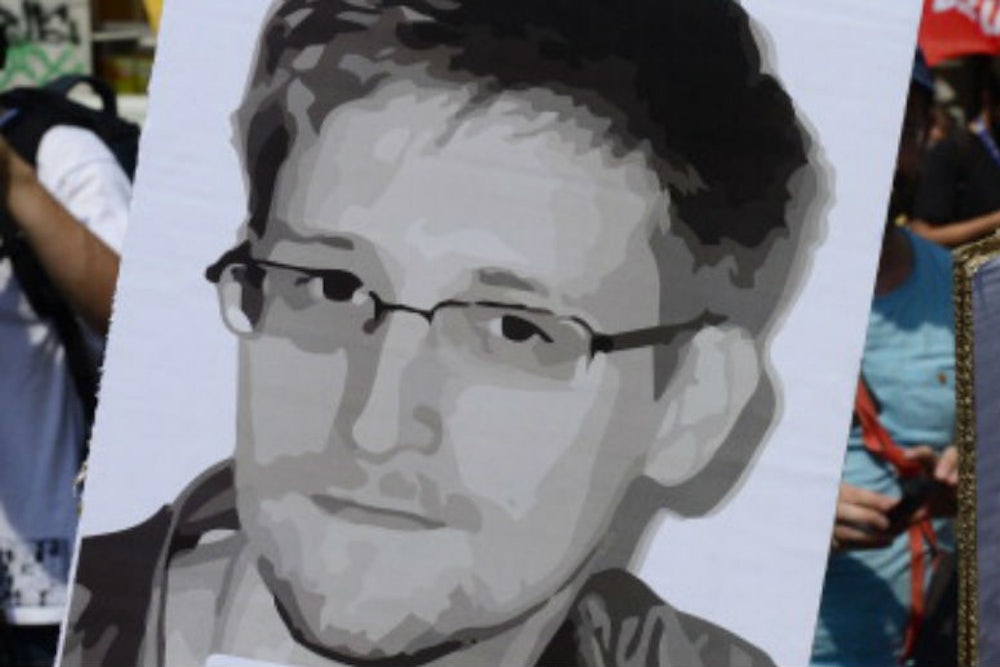Defenders of Edward Snowden routinely accuse the American media of being too cozy with the government. Major newspapers have grown complacent, these critics insist, and mainstream journalists no longer ask the tough questions or play the adversarial role that has long made a vibrant free press the protector of American democracy. This failure of the media is what ultimately justified Snowden’s cosmic leak of National Security Agency documents to a handful of private journalists and anti-government crusaders.
Perhaps that critique is right. But it’s precisely because of that critique that anyone remotely committed to intellectual integrity ought to be flabbergasted by the recent James Bamford profile of Edward Snowden that appeared Wednesday on Wired's website. The profile reads like a release from a Snowden PR press office, replete with fawning asides and subject-serving mischaracterizations. Unwittingly, Bamford demonstrates one of the central problems with the new push for relentless advocacy journalism: In seeking to combat a media that they claim resembles a government press office, these critics have become a far more slanted public relations operation for their own antigovernment heroes.
Bamford must be congratulated on even getting this interview. Edward Snowden is a very difficult man to find; he suspects that he is the target of unceasing capture and eavesdropping attempts by American intelligence agencies, and he relies on a small circle of associates to screen attempts to contact him. Even Bamford, a longtime NSA critic who Snowden must have known would be an immensely sympathetic interviewer, needed nine months of back-and-forth with Snowden’s lawyers and associates before he was able to set up a meeting. Nevertheless, a responsible journalist wouldn’t allow the difficulty of access to permit a controversial subject to completely hijack the narrative. Unfortunately, this is precisely what Bamford does.
Early in his profile, Bamford explains that he has come to Moscow to identify Snowden’s motivations, to uncover “what drove Snowden to leak hundreds of thousands of top-secret documents.” But Bamford spends very little time actually engaging this question. He doesn’t probe Snowden’s politics, general ideological outlook, or psychological profile. Instead he unhesitatingly accepts Snowden’s claim that his transformation from aspiring marine to anti-government mole was purely a product of encountering surveillance programs that he found disturbing. Of course, he hardly needed to travel to Moscow for that; he could have simply read anything by Glenn Greenwald. The reader is thus left wondering: Is Bamford really trying to understand “what drove Snowden,” or did he make up his mind before he ever sat down?
The simplicity of the profile’s narrative is compounded by Bamford’s bewildering reluctance to ask any challenging questions at all. Bamford never asks why Snowden accepted—and even pursued—a series of high-level jobs in signals intelligence despite his misgivings. Bamford never pushes Snowden to face the moral complexity of his choices. And he never asks Snowden to explain whether it was responsible of him to release troves of information that not even he himself had seen. Most remarkably, Bamford seems unwilling to push Snowden on even his most outlandish claims, like Snowden’s insistence that he tried “to leave a trail of digital bread crumbs” so that his colleagues could determine what he had taken, prepare for future leaks, and mitigate damage. Alas, Snowden explains to a sympathetic Bamford, the NSA was simply too incompetent to decipher his clues. (“I figured they would have a hard time… I didn't figure they would be completely incapable.”)
Tell me if this narrative makes any sense: Snowden genuinely wanted to mitigate damage from his disclosure and tried to let the government know what he had taken; but rather than simply giving the NSA the very same file that he handed off to Laura Poitras, Barton Gellman, and Glenn Greenwald, he chose to leave a “trail of breadcrumbs"? Now, national security isn’t quite Grimm's Fairy Tales, nor is it a Dan Brown novel, so perhaps it might have made sense for Bamford to ask why Snowden chose this particular method for helping out his old colleagues at the NSA. And although Bamford is clearly enamored with Snowden’s brilliance (virtually the only family quotation about Snowden that Bamford thought worthy of inclusion was Snowden’s father’s proud mention of his son’s high IQ scores), it's doubtful that Snowden’s attempts at helping were simply too clever for the combined powers of the American intelligence agencies. But again, Bamford doesn’t see fit to ask.
Bamford also engages in some outright distortions. At one point in the essay, he describes a “troubling” memo that suggests that “personal vulnerabilities,” particularly pornography consumption, might be used to “destroy the reputations of government critics.” From this description, the memo does sound troubling, and Snowden’s invocation of the FBI attempts to use Martin Luther King’s infidelity sounds eminently reasonable. The problem, however, is that “government critics” is an astounding attempt to misdirect his readers. The memo actually discusses six specific militant Jihadist propagandists, all of whom live outside the United States. We can, and must, debate the morality and efficacy of using pornography habits to discredit Islamist radicalizers; but labeling such people “government critics” simply isn't honest.
What holds true for this particular memo also holds true for much of the debate over Snowden’s actions: There is a robust argument to be had by serious people committed to truth. But truth is passé, and that argument doesn’t seem to be happening. Because for today’s antigovernment journalists, attempts at impartiality are considered a sign of impurity. Journalism is actually about winning the debate. And more specifically, it’s about waging a scorched-earth war against an out-of-control government. Perhaps that’s a noble cause, but the tactics leave us with public relations instead of journalism. Or to be more precise, they leave us with James Bamford.
